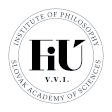Current Dissertations
The Creative Dimension of the Phenomena of the Alien
The topic of the Alien, as the opposite of one's own, has long been one of the hot topics across the social sciences. However, Bernhard Wadlenfels' responsive phenomenology aims to investigate the Alien at the level of its very essence and views every experience as a response to the Alien, disturbing the boundaries of our order. The Alien comes with a demand for a response that we cannot avoid, and which inevitably affects us on multiple levels. The Alien, a radicalized form of otherness, acts here as a hyperphenomenon, emerging with every experience that reflects our subjectivity. It establishes a hierarchical relationship in which we are forced to react with a response that we must first create.
In the dissertation, the creative essence of this specific form of responsivity plays a central role. Research tries to point out its appearance through the dialogical aspects of phenomena such as surprise, startlement or anxiety. However, the main object of interest is the creative process in art, where is illustrated several forms of the phenomena of the Alien and their critical roles in creative experience and its outcome. Insight from the perspective of responsive phenomenology should thus provide expanded possibilities for thinking about improvisation and the attributes and limits of free artistic expression.
The Ideological Influence of the Russian Philosophical and Political Discourse of the 19th Century on the Thinking of Ľudovít Štúr
The topic of the influence of selected Russian intellectuals, specifically the Russian Slavophile circle, on the thinking of Ľudovít Štúr was already addressed in the works of Tibor Pichler and Tatiana Ivantyšynová. However, the authors themselves raised questions regarding the character and intensity of this influence. This dissertation thus builds on the issue of the "reversibility" of Štúr's thinking, which presupposes changes in Štúr's approach to national emancipation and a shift towards the Russian cultural paradigm. In the context of differing perspectives on Štúr's ideological continuity or discontinuity, the thesis leans towards the former position and formulates the hypothesis that, in terms of ideological content, Štúr's thinking did not exhibit an uncritical shift.
The research is based on the three-phase division of Štúr's thinking, proposed by Tibor Pichler, which includes: 1) evolutionary rationalism, 2) revolutionary monarchism, and 3) tsarist fundamentalism. Štúr is perceived primarily as an intellectual actor in national transformation, who theoretically legitimized the Slovak national emancipation process. Special attention is therefore given to Štúr's specific interpretation of German Romanticism and idealistic-rationalist philosophy in terms of the national-social demands of the Slovak ethnicity. It is assumed that the original handling of the categories of reasonableness, freedom, necessity, history, nation, subjectivity, and objectivity in the first phase already brought Štúr's thinking closer to that of the Slavophiles. In this context, the thesis focuses on Štúr's theologism and Slavic Romanticism. The research objectives include: a comparison of the thinking of Štúr and the Slavophiles, the definition of the degree of Štúr's ideological originality and independence, the classification of Štúr as an intellectual actor of national transformation, and the determination of the degree of Štúr's ideological continuity in the three outlined phases.


